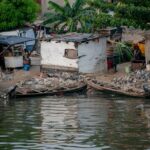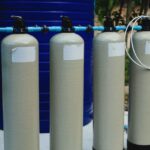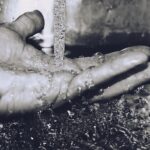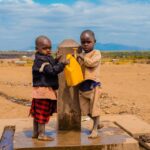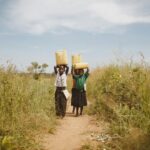Access to Clean Water in Rural Ghana: What’s Being Done?
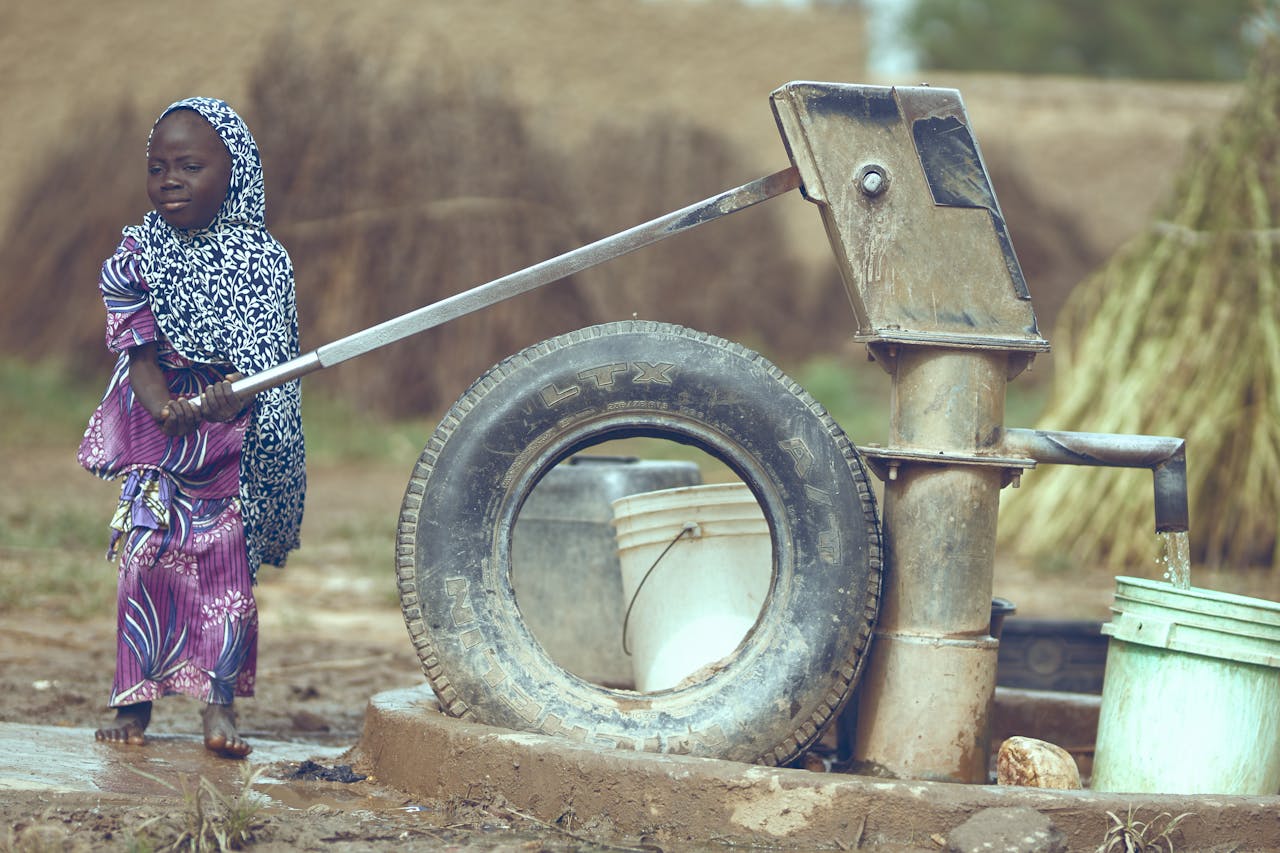
In many rural parts of Ghana, getting clean water is a daily struggle. People rely on rivers, wells, and boreholes, but not all these sources are safe. Contaminated water leads to sickness, making life harder for families, especially children. Clean water is not just about drinking – it affects health, education, and work. Many groups, including the government and NGOs, are working to change this, but challenges remain.
The Reality of Water Access in Rural Ghana
In rural areas, many people fetch water from nearby rivers, ponds, or hand-dug wells. Some communities have boreholes, but they don’t always work due to poor maintenance. Others have small water systems, but they might not reach every home.
Many women and children walk long distances just to collect water, taking time away from work, school, and family life. During the dry season, the situation gets even worse as water sources dry up, forcing people to travel even farther.
Health Risks of Unsafe Water
Drinking unsafe water can cause serious health problems. Diseases like cholera, typhoid, and diarrhea are common, especially among children. Poor sanitation makes things worse because dirty surroundings allow bacteria to spread easily.
When people fall sick often, they miss work and school. For pregnant women, unsafe water increases the risk of complications. Hospitals in rural areas are often far away, and some families can’t afford treatment, making waterborne diseases even more dangerous.
Government Efforts to Improve Water Access
The Ghanaian government has been working to provide clean water, but progress has been slow. They have built boreholes, small-town water systems, and filtration plants in some communities.
However, funding and maintenance remain big challenges. Some water projects stop working after a few years due to lack of repairs. The government also faces issues with population growth and climate change, which put more pressure on existing water sources.
While improvements have been made, many rural areas still lack consistent access to safe water, showing that more work is needed.
The Role of NGOs and International Organizations
Many non-governmental organizations (NGOs) and global partners are stepping in to help. Groups like Aqua Maya, WaterAid, and the World Bank are funding and building boreholes, wells, and filtration systems in rural communities. Some organizations also focus on education, teaching people how to keep their water clean and maintain the systems installed.
One major challenge is ensuring long-term success. Some projects fail because local communities lack the tools or skills to repair broken pumps and pipes. To solve this, many NGOs now train locals to maintain their own water sources, making these solutions more sustainable.
Traditional and Community-Based Water Solutions
Before modern water systems, many rural communities had their own ways of managing water. Some collected rainwater in large clay pots, while others dug wells by hand. These methods are still used today, especially in areas without boreholes.
In some villages, local committees manage water sources, ensuring everyone gets a fair share. These groups also collect small fees from households to pay for repairs. When communities take charge, water systems tend to last longer because people feel responsible for keeping them running.
Challenges Affecting Water Access in Rural Ghana
Many communities still rely on unsafe water, leading to ongoing health and economic struggles. Despite efforts to improve water access, several obstacles remain:
• Climate Change: Longer dry seasons mean wells and rivers dry up faster.
• Poor Infrastructure: Many boreholes break down due to lack of maintenance.
• Population Growth: More people need water, putting pressure on existing sources.
• Lack of Funding: Many projects start strong but struggle to continue due to limited money.
• Water Pollution: Mining, farming, and waste dumping contaminate many water sources.
Success Stories: Communities That Now Have Clean Water
Regardless of the challenges, some villages have seen big improvements. In parts of northern Ghana, water projects funded by international partners have changed lives. Boreholes with hand pumps have reduced long walking distances for women and children.
One success story comes from a community where an NGO trained locals to manage and repair their own boreholes.

By collecting small contributions, they keep their water system working without outside help. These stories show that with the right support, lasting change is possible.
Government Policies and Initiatives
The Ghanaian government has made clean water a priority, especially for rural areas. Programs like the National Community Water and Sanitation Strategy (NCWSS) focus on increasing the effective and sustained use of improved community water and sanitation services in rural communities and small towns.
One key approach is working with local governments and private companies to expand water supply infrastructure. The Ghana Water Company Limited (GWCL) handles urban areas, while the Community Water and Sanitation Agency (CWSA) focuses on rural communities. However, progress has been slow due to funding challenges and maintenance issues.
In recent years, partnerships with global organizations have helped improve water access, but many rural areas still lack reliable solutions. Stronger policies and better funding are needed to reach more people.
The Role of Technology in Expanding Water Access
Technology is playing a growing role in solving Ghana’s rural water challenges. Innovations like solar-powered water pumps are making it easier to bring clean water to remote villages. These pumps work without electricity, using sunlight to draw water from underground sources.
Another advancement is mobile payment systems, which allow communities to pay small fees for water using their phones. This money helps maintain water systems, ensuring they don’t break down.
Smart sensors are also being used to monitor water quality and detect leaks in pipes. These tools help prevent water loss and keep supply systems running smoothly. While technology alone won’t solve all issues, it is making water access more efficient and sustainable.
The Impact of Climate Change on Rural Water Supply
Climate change is making it harder for rural communities in Ghana to access clean water. Longer dry seasons and unpredictable rainfall mean that many water sources, like rivers and wells, dry up faster. When this happens, people, especially women and children, must travel farther to fetch water, sometimes from unsafe sources.
Flooding is another issue. Heavy rains can contaminate wells and boreholes with dirt, waste, and bacteria, making the water unsafe to drink. Without proper drainage and filtration systems, many communities struggle with waterborne diseases.
To adapt, some villages are digging deeper wells, building small dams, and using rainwater harvesting systems. But more long-term solutions, like better water storage and stronger environmental policies, are needed to protect water sources from climate change effects.
The Importance of Community Involvement in Water Projects
For any water project to succeed, the local community must be involved. In many rural areas, people are trained to manage and maintain their own water systems. This ensures that when something breaks, they don’t have to wait for outside help.
Some villages have formed water committees, where members collect small fees from households to fund repairs and maintenance. This helps keep the water supply running smoothly.
Educating communities about hygiene and sanitation is also important. Even when clean water is available, people need to know how to store and use it safely to prevent diseases. When locals take ownership of water projects, they are more likely to last for years.
The Role of Public-Private Partnerships in Expanding Clean Water Access
Solving Ghana’s rural water crisis requires collaboration between the government, private sector, and non-profit organizations. Public-private partnerships (PPPs) are playing a key role in bringing clean water to underserved communities.
Private companies often have the funds and technology needed to build and maintain water infrastructure, while the government provides policies and oversight. NGOs and charities also step in to educate communities, train local water managers, and ensure long-term sustainability.
For example, some companies invest in borehole drilling and water purification systems as part of their corporate social responsibility (CSR) programs. Others work with the government to build large-scale water treatment plants that serve multiple communities.
By working together, these partnerships help reach more people, ensuring that rural communities have a reliable and lasting source of clean water.
Conclusion
Access to clean water in rural Ghana remains a pressing issue, but significant efforts are being made to bridge the gap. Challenges such as unreliable water sources, inadequate infrastructure, and financial constraints continue to affect many communities. However, solutions like boreholes, hand-dug wells, and rainwater harvesting systems are helping to provide safer drinking water.
Community involvement plays a crucial role in maintaining water systems, ensuring their sustainability for years to come. Education on hygiene and sanitation further enhances the impact of these efforts, reducing the spread of waterborne diseases. NGOs and charities like Aqua Maya are working hard to bring clean water to those who need it most, often collaborating with government agencies and local leaders to make lasting changes.
Technology is also transforming the water sector, with innovations like solar-powered pumps and smart water monitoring systems improving efficiency. At the same time, public-private partnerships are stepping in to expand access, combining resources and expertise to reach more underserved areas.
While progress is being made, more work is needed to ensure that every rural community in Ghana has access to safe drinking water. Continued investments, policy support, and community-driven initiatives will be key to making clean water a reality for all.
Sources
1. https://www.unicef.org/wash/water
3. https://www.dri.edu/funding-provides-safe-drinking-water-to-communities-and-jobs-in-northern-ghana/

